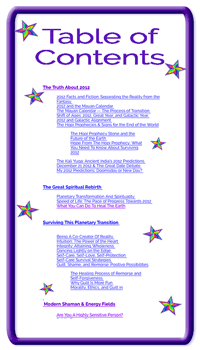Want To Know What Visualization Really Is?

|
|
|
|
|
usually think the definition of visualization is "seeing something in our mind's eye."
This information is incomplete at best, and misleading as well. It makes some of think we can do it extremely well, when actually we're missing key components. And it makes others of us think we can't do it at all. In fact, it is as natural as using any other sense . . . seeing, smelling, and feeling what's in front of you. Everyone does it . . . that's the purpose of imagination. If you have an imagination, I guarantee you can visualize. And in case you doubt you have an imagination, I guarantee you do have one! You use it . . .- when you dream,
- when your mind wanders during a boring meeting,
- when you think of what you want for dinner,
- when you try to remember where you parked . . .
- let's you remember things,
- let's you anticipate happy things in the future,
- gives you the ability to worry,
- inspires solutions to problems that arise,
- gives you ideas like a new spice to add to an old recipe, or how to do something more efficiently,
- allows you to tell other people about things that have happened to you,
- and makes you see things, visually? (Your eyes don't actually "picture" anything... it is your mind's imagination that puts together electrical impulses to create an image of what you're looking at.)
"But I Can't Visualize . . . Can I?" — Wanna Bet!
As I said, everyone can do this. And everyone includes you! The funny thing about it is that everyone does it all the time. Some people are just better at noticing it. Even with visuals! I'd bet you $10 you can call up pictures on the screen of your mind, at least sometimes. Want to try it? Close your eyes. Take a deep relaxing breath . . .- Think of where you keep your keys.
- Think of the person you love most.
- Think about what's in your refrigerator.
What Visualization Looks Like
We all envision things unconsciously, that is, when we aren't trying. You just don't normally notice these mental pictures, because they go by so quickly. And because you don't stress about how perfect or imperfect it is. This is information that is critical to your success, but often overlooked! When you call it "visualize", it's easy to expect too much. But images in your head just aren't going to be as clear as looking at something with your eyes. Not for the vast majority of people. That's okay. That's normal. They might look like . . .- a fleeting image,
- a snapshot,
- a full-colour motion picture.
With Brightest Blessings,
erin Dragonsong

Return from
What Is Visualization?
to
Wicca Practices










